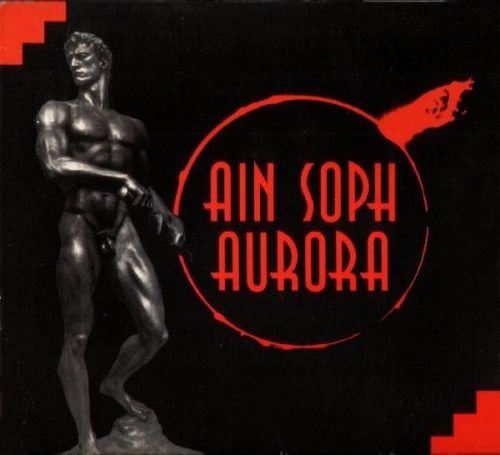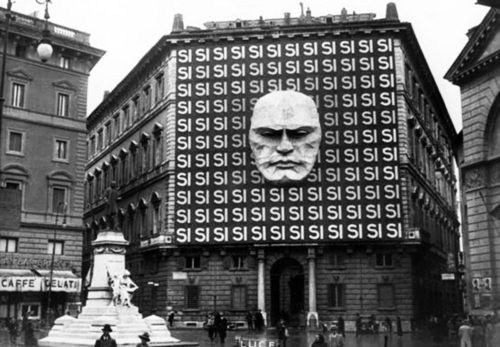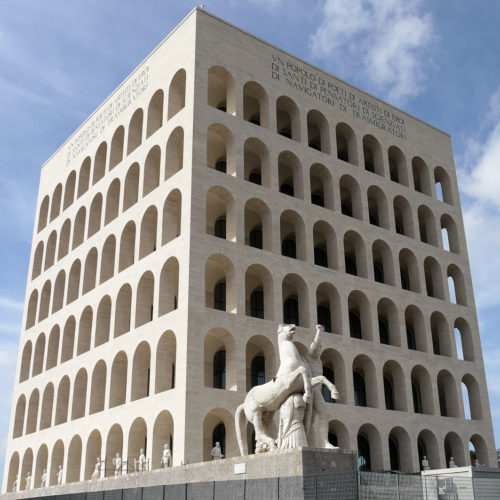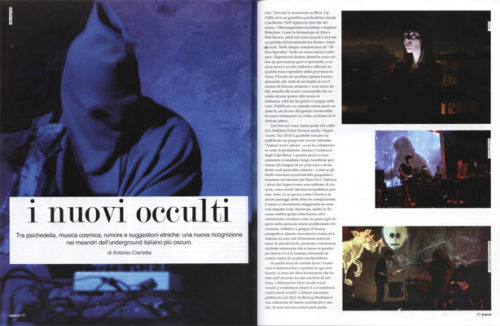
Tell us please about the origins of Ain Soph? When and how did it happen? Who were the first members of the band? Who and what was the most inspiring to you at that time?
The ASs were formed in the autumn of 1984. In the first formation there were Foraenovis and Atrocity h. and Thx. Then I joined the Clau-dedi, Crucifige group and finally Spectre. In the early works, [we were influenced by] Crowley, A.O.Spare and all that stuff tied to the ceremonial magic of Golden Dawn. The AS’s music was only to serve as an accompaniment to magic rituals. Rituals that were then accomplished by some of us. Needless to say, the results were not satisfactory. So after various failures we left the ceremonial magic and everyone went on their own way working alone.

Could you tell us please about Italian underground movement of the time when you started? What time was it, what people were there, what ideas were floating?
The Italian scene of the time did not contemplate many groups similar to us. We remember the Rosemary, the Tac, the Toniutti brothers, and somebody else. Most of the scene was occupied by new wave, dark and industrial groups (eg lyke wake, etc.). It was a very boring situation … so many people who took too seriously. The only group we were closely linked with was (and are) the Circus Joy (really big).

Could you tell us, what is the status of Ain Soph today? According to discogs, your last LP, “Prima Dell’Aurora” was released almost fourteen years ago. But the band is still active and you’re doing shows, at least, in Italy. What are your future plans and will we ever hear another Ain Soph’s album?
We are currently going to finish a new album. By the end of the year (2017) will come out. As everyone knows, we are not very prolific. We usually work on a new album only when we have something to say or a new idea. The fact is that none of us live in music (we want it: we are not minstrel!) And the time for composing and playing is never enough. We occasionally do some concerts, but only if [it’s] the situation we like.
The Ain Soph’s discography of 30+ years is really varied, the albums are very different from each other. Tell us please about the each period of band’s manifestation? What is your favourite Ain Soph’s album and why?
We can split the AS’s discography into three major periods: an initial period (from the first work to Kṣatriya) devoted to ceremonial magic; an intermediate period (from Kṣatriya to Aurora), very intense, both musically and magically, and finally a last period in which magic has left its place in guerrillas (from October onwards). We can consider these three periods as the “great work” on the contrary. We explain it better: in alchemy the great work is the process of processing and transforming raw material, aimed at realizing the philosophical stone. It consists of three different operations: nigredo, albedo and rubedo. From the first-to-last-to-last-rupture is a progressive purification of the material and psychic wastes that impede the spiritual development of the human being. Now we AS with Kṣatriya have illustrated rubedo, with Aurora albedo and with October nigredo. Here is also the answer to the next question, with Kṣatriya, Aurora, and October the three most important works of the AS.

If someone will listen your albums separately from each other, he could suspect Ain Soph in sympathy for communism (“Октябрь”), white guard (“Aurora”) or even for that scary F-word if he will find you track on “Cavalcare La Tigre – Julius Evola: Centenary” compilation along with Von Thronstahl and Blood Axis. Which is kinda mutually exclusive things. But does politics really matter for Ain Soph? What is it behind that historical figures and events that inspired you and that you wanted to show?
We consider politics as a plebeian activity. If the choice is only along a horizontal line (right-to-left) it remains in the “human too human” as Nietzsche said. We move vertically (high – low). Any current ideology conforms to our thinking is fine. But at the moment we do not seem to find anything that satisfies us. This also applies to the past. Certainly we can not deny the devastations made in the world by certain totalitarianisms (communism in the first place, but also Nazism), but we do not adhere to any of these “pairs” ideologies. We feel closer to concepts such as “empire”, “royal power,” etc. but all this is too complicated to explain in a normal interview. Let us therefore recite to those who are interested in the writings of Evola and Reghini.

One of Ain Soph’s last appearances is the track for the compilation “Horosho! – A Tribute To Vladimir Mayakovsky & Russian Futurism”. What is futurism for you? It seems like Italy and Russia were deeply connected by this movement 100 years ago. What do you feel about the specific Italian poetry movement – “Hermeticism”, inaugurated by Giuseppe Ungaretti? There was a short-lived revival of that movement, neo-futurism, in the 60-70s, now in the form of “architectural future”, when people like Buckminster Fuller (who invented the geodesic dome) tried to figure out the better future for mankind via rebuilding. It came up once again in 2007, when designer Vito Di Bari wrote “Manifesto of Neo-Futuristic City” for Milan EXPO-2015. Petronius Arbiter in “Satyricon” 2000 years ago complained about overpopulation, ugly high-rise buildings and noise – basically the same as today. How do you think, could the society and the human being itself be improved or changed by radical rebuilding of the environment?
Futurism for us is just an artistic-philosophic current. One of the many that have been generated in recent centuries. It only interests us to the extent that it can illuminate the “partial and incomplete” idea of the spiritual degeneration of humanity. While based on correct assumptions: discomfort with the materialistic mentality dominant, futurism has moved not towards higher spiritual horizons but rather directed its research towards the most sub-human aspects of man. Ungaretti could instead be a more fascinating speech for his intuition on Dante and the faithful language of love.



What do you feel about another specific Italian movement of these days – Italian occult psychedelia? There are very interesting sounds, like Heroin In Tahiti, but it is not obvious for us, what is so “occult” about that. If you name your band “Fulcanelli” it doesn’t automatically transform your guitar into the sound grimoire. What do you think about young people, especially artists, and their principal understanding of occult core? Could it be understood today for more than a few individuals?
We do not know very well about this Italian movement you are talking about. Indeed, we do not care much about the Italian and international music scene. We know people. Some are very interesting, another much less. It may happen that we play in Moscow and meet a person who is doing our own way instead of playing in Italy and meeting only … musicians and artists. Esotericism implies a strictly personal work, not always easily shared. So these alleged esoteric groups (especially those formed by young musicians) leave us very perplexed. By this I do not mean that we are closed to any comparison, but only that we try to find people who can contribute to our inner work. People of all ages, sex and convictions.

There is a legend of the ancient initiatory tradition that, prior to Christianity, had flourished in Magna Graecia in the Pythagorean School, which had taken in the Isiacal and Osirian cults from Egypt. True or not, it is a fact that Italy once was a cradle of hermetic knowledge and heroic enthusiasm – Giordano Bruno and Pico della Mirandola are just the most well-known “martyrs”. There is a huge pile of books not translated from Italian, like Luigi Valli’s “Il linguaggio segreto di Dante e dei Fedeli d’Amore”. What is happening today in Italy, where is everything that matters? It is hard to believe that just 100 years after Kremmerz the ‘solidification’ of the sensible world just destroyed any effort to overcome.
In Italy, what is happening in other parts of the Western world happens. An informal mass of individuals completely disconnected from the sacred, far from the natural order of things; impregnated with presumption and ignorance. This is the Kali-Yuga, this is the time of the Trolls and the Orcs as Tolkien said. It is useless to cheat that something will change shortly. We just have to give enough rope to the hangover so that we can get it alone and … wait for and transmit to the next generations the “traditional doctrines”.
It seems that cinema in XX century was one of the main cultural export of Italy: from Visconti to Leone to Pasolini et cetera. Today it is only Hollywood. What are Ain Soph’s favourite films that have really strong influence on you (not necessary Italian, of course)?
We have always been closely linked to the art disciplines, of course music, but also writing (essays, articles, poems, stories) and the image in its manifold forms of expression: painting, graphics, performance, theater, cinema; because there is a lot of practitioners who are practicing for us and for our own personal interest. So cinema, a kind of cinema, is of great importance to us. We especially love Ingmar Bergman’s films: ‘The Seventh Seal’ and ‘Wild Strawberries’; Luis Bunuel’s surreal cinema: ‘The Angry Destroyer’ (perhaps, “El ángel exterminador”, 1962? – MAGREB); all of Stanley Kubrick’s cinema, including Shining; the visionary cinema of Federico Fellini, the ‘Neorealism’ of Vittorio De Sica: ‘Bicycle Thieves’ and Roberto Rossellini: ‘Rome, Open City’ and in particular Rossellini’s ‘didactic’ films such as ‘Socrates’ and ‘Cartesius’. We love Dario Argento’s ‘Horror’ movies: ‘Deep Red’, “The night of the living dead”. Just to name a few, but there are so many other directors who admire that particular industry. Finally, we are fascinated by avant-garde directors such as Kenneth Anger, Jim Jarmusch, David Lynch with the film ‘Eraserhead’ and many others.







